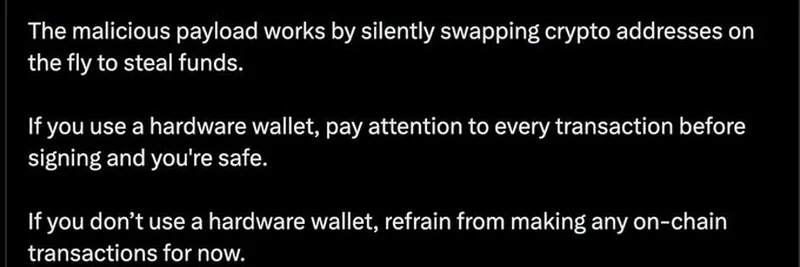Hey there, meme token fans! If you're deep into the world of Solana pumps, Ethereum flips, or any of those wild meme coin rides, you've probably got your software wallet ready for quick trades. But hold up—there's a serious alert shaking up the crypto space right now. Ledger's CTO, Charles Guillemet, just dropped a bombshell on X about a huge supply chain attack hitting the NPM ecosystem. This isn't just tech jargon; it could directly mess with your meme token holdings if you're not careful.
What's Going On with This NPM Attack?
NPM, or Node Package Manager, is basically the go-to hub for JavaScript developers to share and grab code packages. Think of it as a massive library where devs pull tools to build apps, including a ton of crypto-related stuff like wallets and decentralized exchanges (DEXes). According to Guillemet's post, a reputable developer's NPM account got hacked, and malicious code was slipped into packages that have been downloaded over a billion times. That's not a typo—billions!
The sneaky part? This bad code acts like a "crypto clipper." It quietly swaps out wallet addresses during transactions, redirecting your funds straight to the hacker's pocket. Imagine you're sniping a hot new meme token on a DEX, and boom—your ETH or SOL ends up with some cyber thief instead. Reports from sources like CoinDesk and The Block confirm this affects popular packages like Chalk, with combined weekly downloads topping 2 billion. The attack hit 18 packages in total, compromised via a phishing scam mimicking NPM support emails.
How Does This Hit Meme Token Traders?
Meme tokens thrive on speed and hype—pump.fun launches, Raydium swaps, you name it. Many of these platforms and tools rely on JavaScript under the hood, meaning if your wallet app or browser extension (think MetaMask, Trust Wallet, or Exodus) has pulled in one of these tainted packages, you're at risk. Software wallets are the prime targets here, as the malware can intercept transactions before they hit the blockchain.
If you're trading meme coins on chains like Solana or Base, where things move fast and fees are low, this attack could drain your portfolio in seconds. And while it's unclear if seed phrases are being stolen directly, the address-swapping trick is enough to cause chaos. As one crypto dev put it on X, this is "the biggest developer supply chain attack in history."
Safety First: What You Should Do Right Now
Guillemet's advice is straightforward and spot-on, especially for us in the meme token game where FOMO can lead to hasty clicks:
If You Use a Hardware Wallet: You're in a better spot. Devices like Ledger keep your private keys offline, so the malware can't touch them directly. But double-check every transaction detail before signing—make sure the address matches what you intended. No rushing into that next meme pump without verifying!
No Hardware Wallet? Hit Pause: Refrain from any on-chain transactions for now. That means no buying, selling, or swapping meme tokens until the dust settles. Patches for the affected packages started rolling out around 3:15 PM UTC on September 8, but frontends on websites might still be vulnerable.
General Tips for Meme Token Safety:
- Audit your dependencies if you're building or using custom tools. Pin safe versions in your package.json to avoid auto-updates pulling in bad code.
- Use tools like npm audit or Snyk to scan for vulnerabilities.
- Switch to hardware wallets for long-term holds—meme tokens might be fun, but losing them to a hack isn't.
- Stay updated via reliable sources. Check out the full report on the attack at jdstaerk.substack.com for deep technical dives.
This attack highlights why security is non-negotiable in crypto, especially in the meme token niche where scams and rugs are already rampant. It's a reminder to treat your wallet like your bank account—paranoia pays off. As the situation evolves, we'll keep you posted here at Meme Insider. In the meantime, stay safe, trade smart, and let's hope this gets resolved without too many casualties in the meme world!



